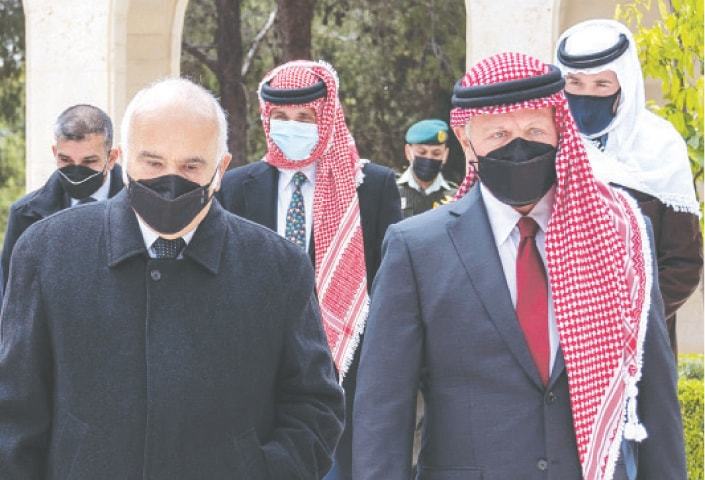AMMAN: Jordan’s King Abdullah appeared in public on Sunday alongside his half-brother Prince Hamzah, state TV showed, their first joint appearance since a palace crisis involving the prince rocked the kingdom.
The images showed a group of Hashemite royals at a mausoleum where their ancestors are buried, on the 100th anniversary of the founding of the desert kingdom.
The palace Twitter account published a picture of the group at a cemetery with the caption “HM King Abdullah II, HRH Crown Prince Al Hussein… (and) Hamzah bin Al Hussein… visit tomb of HM the late King Abdullah I”.
All were dressed in civilian clothes, apart from Hussein, the heir to the throne, who wore military dress.
Jordan was marking 100 years of national survival Sunday as a resource-poor country in a war-ravaged neighbourhood, but the palace crisis and the coronavirus pandemic have overshadowed celebrations.
The government had accused Hamzah — a former crown prince who was side-lined as heir to the throne in favour of Abdullah’s son Hussein in 2004 — of involvement in a conspiracy to “destabilise the kingdom’s security”. At least 16 people were arrested.
But Abdullah said Wednesday that Hamzah, who has signed a letter pledging his loyalty to the king following mediation by an uncle, was safe in his palace under his “care”.
In an address read out in his name on state television, the king added that “sedition has been nipped in the bud”.
Jordanian political analyst Labib Kamhawi told AFP the appearance of the king and Prince Hamzah together “sends a clear message that the crisis file within the royal family has been closed”.
“It shows the Royal family is united.” But, he added, the fact that Prince Hamzah stood behind the king and his uncle prince Hassan and Crown Prince Hussein… and not beside the king means he is now a normal prince, not on the level of a king or his crown prince”.
‘Steps of the ancestors’
Hamzah had been appointed crown prince and heir to the throne in 1999 in line with his father’s wishes, but Abdullah stripped him of the title in 2004 and named his own eldest son Hussein in Hamzah’s place.
Hamzah in a video message published by the BBC on April 3 claimed he had been placed under house arrest and accused Jordan’s rulers of corruption and ineptitude.
Foreign Minister Ayman Safadi then charged that a group of plotters had linked up with foreign parties to destabilise Jordan, but declined to identify them.
After mediation talks, however, Hamzah voiced his loyalty to the king.
“Prince Hamzah pledged before the family to follow in the steps of the ancestors, remain loyal to their mission, and to put Jordan’s interest, constitution and laws above all considerations,” the king said Wednesday.
A probe into the events continues, the king added.
The crisis laid bare divisions in a pro-Western country usually seen as a bulwark of stability in the Middle East.
Jordan borders Israel and the occupied West Bank, Syria, Iraq and Saudi Arabia. It hosts US troops and is home to millions of exiled Palestinians and many Syrian refugees.
The king’s address followed orders issued by Amman prosecutor Hassan al-Abdallat that banned the publication of any information about the alleged plot in order to keep the security services’ investigation secret.
